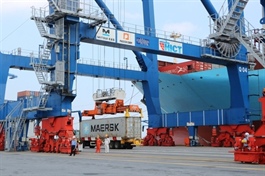Vietnam steps up tax reduction, consumption promotion to maintain growth momentum
Vietnam steps up tax reduction, consumption promotion to maintain growth momentum
Vietnam’s economy is showing signs of positive growth, supported by upcoming value-added tax reduction and consumption promotion.

It is high time to take steps to gain strong growth momentum, said many experts and firms.
Nguyen Anh Duc, chairman of the Association of Vietnam Retailers, told Tuoi Tre (Youth) newspaper that shopping vouchers and discounts will be offered to spur personal spending.
However, it is necessary to make promotion programs unique to accelerate consumer spending effectively.
For example, in the past, supermarkets launched discount-sales programs based on international markets such as the Week of this nation’s goods, or that country’s commodities. Now, promotion programs depend on items like ‘Week of Mangos.'
Retailers have worked with localities to select suitable products for each season to promote consumption to make them profitable, Duc said.
The domestic market is seeing two major sources of goods from exporters and foreign importers.
Many foreign firms facing difficulties in the global market tend to tap the Vietnamese market.
Free trade agreements with preferential export taxes also encourage them to expand their reach to Vietnam.
The shift will provide a wide range of options for local consumers, but it will challenge domestic producers at the same time.
As such, the government should issue incentives and supporting policies to help local firms lower their production costs to make the prices of their products more competitive.
Nguyen Nguyen Phuong, deputy head of the Ho Chi Minh City Department of Industry and Trade, said that the department has rolled out various consumption-driven supporting programs and advanced connectivity between local goods and foreign markets.
Also, the department will hold export fairs and launch discount programs to help firms find more buyers and boost consumption.
Speaking of the tax reduction, Nguyen Bich Lam, former head of the General Statistics Office, said that the national government directed the Ministry of Finance to issue policies on extending tax payment deadlines, delaying payment for land use, and cutting the value-added tax by two percentage points.
Besides, since the start of the year, the government and the prime minister has issued various resolutions and decrees to remove obstacles facing the real estate market and the bond market.
Notably, Vietnam lowered interest rates while other major economies kept their operating rates unchanged. The Southeast Asian country’s rate cut was aimed at backing economic growth.
Nguyen Anh Duc appreciated the value-added tax reduction as the the cut would ease the burden on firms and consumers.
In mid-April, the government approved the Ministry of Finance’s proposal to revise down the value-added tax to eight percent from 10 percent for goods and services this year to prop up economic growth.
The government on Sunday sent a resolution draft to the lawmaking National Assembly to seek approval for the value added tax cut.
Dr. Nguyen Quoc Viet, deputy head of the Vietnam Institute for Economic and Policy Research, also highly valued the tax reduction, saying that despite the mild cut, positive impacts on all fields will follow.
The tax cut will stimulate consumer spending and speed up firms’ business and production recovery, Dr. Viet added.
The tax reduction will act as a cushion against inflation at the end of the year, he said.
These promotional programs should be conducted in combination with tourism promotion, and based on technology.
The country saw the index of industrial production in April rise 3.6 percent year on year, while the number of newly-established firms made a year on year increase of 12.3 percent.
Besides, Vietnam enjoyed a trade surplus of VND35 trillion (US$1.5 billion) in April.



























